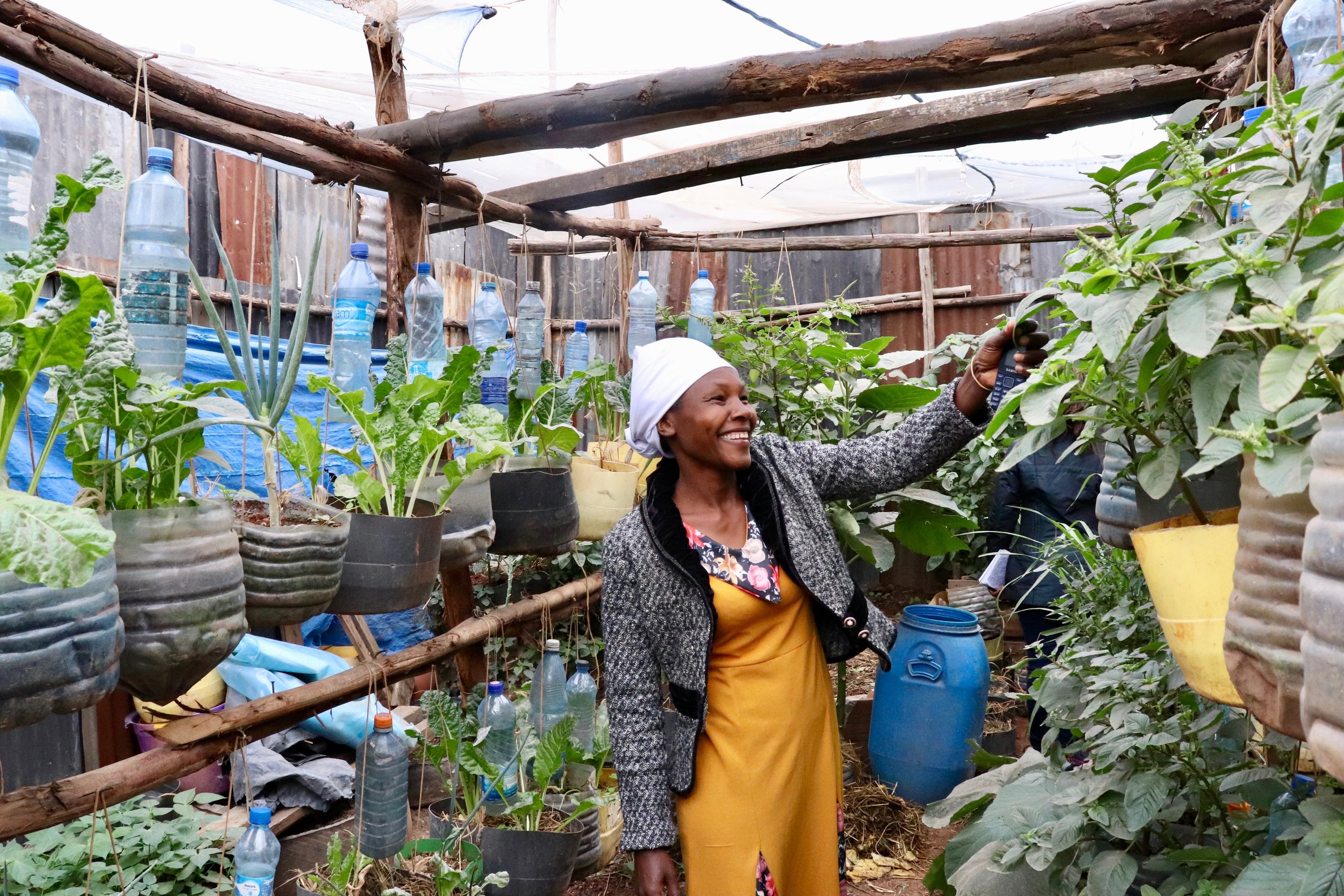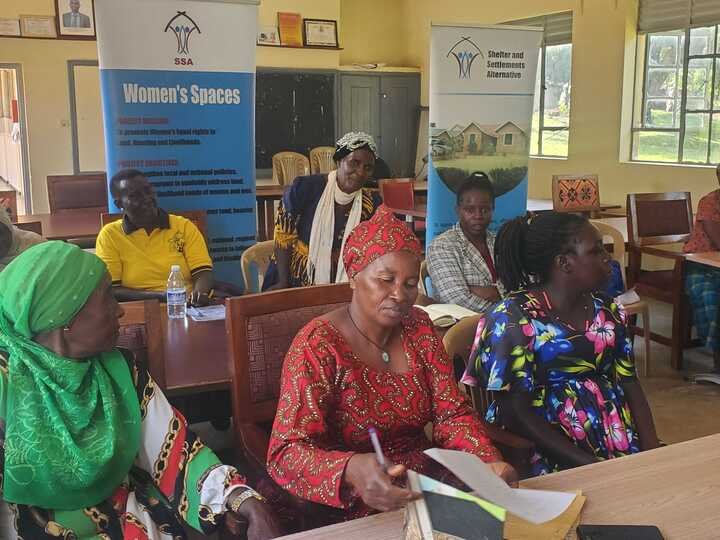
Women’s Spaces Project
What will a future marked by women’s empowerment be like?
It will feature women’s voices, powerfully united to overcome injustice and realize fundamental human rights.
Women living in semi-urban areas make up a quarter of the world’s population and experience the harshest forms of poverty and marginalization. Land is their most basic and most life-giving asset, providing food, housing, and income. Investments in women’s land rights are a prerequisite to full and substantive gender equality that benefits those most in need.
Property rights have created certainty, investment, and economic growth for Sub Saharan Africa, but this has mostly benefited men. Especially in emerging economies, women still access land mostly through male relatives, and are often themselves still considered or treated as property. Law and custom limits women’s rights to land in half the world’s countries. Women are often left out of data collection on land and housing, further putting them at a disadvantage when governments distribute land, or provide services for agriculture and access to credit.
Women have a right to participate, their perspectives are critically needed in governance of the world’s most important resources, including decision-making and policy creation on national and global level issues:
Food security
Peace-building
International trade
Investment
Climate Change
Land use planning and management
No matter what poverty looks like, no matter how economies shift, land will always be at the center of human wellbeing. And control over land will always mean power.
For women worldwide, strong land rights create a bedrock of dignity and a stairway for empowerment. Securing women’s land rights builds women’s perception of their own power, and foundationally disrupts the status quo of women’s exclusion. Without land rights, other interventions lack a necessary foundation for effectiveness and sustainability, leaving women on shaky ground.
Women’s Spaces Project in Angola, Kenya, South Africa, Uganda
The Women’s Spaces Project: Implementing Equal Rights to Land Housing and Livelihoods, is a five year program which began in 2022. WSP will contribute to poverty reduction and deliver meaningful change to poor and vulnerable women and girls living in urban and peri-urban informal settlements through its ultimate outcome “enhanced implementation of women’s equitable rights to and control over land, housing and livelihoods in urban environments.” To achieve this goal, Rooftops Canada has partnered with four organizations in Angola, Kenya, South Africa and Uganda. All four organizations are addressing the project’s ultimate outcome through community-based activities.
Angola: Development Workshop (DW)
DW is a key player in their government’s decentralization program. Through the Women’s Spaces Project, they are focusing on the capacity building of local authorities, community and women’s organizations to co-produce land maps and data, and co-manage customary, social and informal land tenure. The project responds to the lack of delineated lands and legal titles recognizing occupancy rights in Angola. At project inception, only about 2% of occupants have recognized legal titles to lands they occupy. This statistics will greatly be impacted by the development and use of the Social Tenure Domain Model and the SAGIT tool.
The STDM and SAGIT tools are participatory land management tool to be used by CBO’s, CSO’s, local leader, municipal administrators, and leaders at different levels. The tools will be customized, shared and utilized with the project stakeholders. The project will further embed the protection of gender equal land rights into these tools, and scale up through the national government’s land tenure program while assisting the ministry responsible for women to meet its gender equality objectives.
1,540 households (9,240 people) in three municipalities of Huambo, Cachiungo, and Chicala Cholohanga will secure their land tenure at the end of the project.
4,630 households (27,780 people) will benefit from improved future opportunities for secure tenure.
35% of all these households are women headed.
980 people (60% women) from national and local government, traditional leaders, CSOs and CBOs will be directly involved in project capacity.
Kenya: Mazingira Institute
Mazingira Institute is an active participant in the local and global process, with a strong working relationship with the Nairobi local authority, based on their extensive experience supporting urban agriculture and food security. The project will assist the authority to operationalize legislation that mandates municipalities to provide land, water and other resources to slum dwellers to grow, process and market food. Innovative mechanisms to provide gender equal access to public and private land will be developed, and a demonstration unit will promote environmentally-positive urban agriculture practices.
Capacity building of the authority will help ensure equal participation of women through improved outreach and public education.
1,600 urban farmer households (8,000 people) will access training and support, new lad and other resources to increase household incomes and food security.
720 more households (3,600 people) will indirectly benefit from extension services.
30% of all households are women headed.
80 local officials and CSO members (60% women) will also directly benefit from training activities.
South Africa: Socio-Economic Rights Institute (SERI)
SERI is coordinating CBOs and CSO land advocacy platforms to develop policy briefs, legal submissions, tenure rights education programs and advocacy campaigns aimed at addressing systemic obstacles and discrimination against women in both informal settlements, and in formal tenure contexts. An in-depth gender analysis will result in a gender equality strategy focusing on housing and land tenure. Key policy stakeholders in government, agencies and the legal system will be exposed to new policies and practices that will help fully implement gender equality in land and housing.
Uganda: Shelter and Settlements Alternatives (SSA)
In Uganda, the Women’s Spaces Project is working with implementing partner, SSA, a group of CSOs, CBOs, academic institutions and professionals to increase the ability of local authorities and community opinion leaders in four peri-urban districts (Kamuli, Kayunga, Mityana, Entebbe) to promote positive action on women’s rights to land housing and livelihoods. This will be reinforced by building the capacity of community paralegals to support individuals, primarily women, experiencing land, livelihoods, and housing rights violations. It will also support women’s groups and communities to negotiate land tenure claims and advocate for increased land, resources and services. This will also encourage more inclusive community engagement and longer-term social stability.
Documenting land tenure and gender equality issues, and training on monitoring international human rights commitments will strengthen CSO advocacy for national gender-responsive policy and legal reforms.
865 female headed households (3,440 people) will directly benefit from paralegal support and secure land/housing.
2,120 other households (8,480 people) will have increased knowledge and opportunities for land, housing and livelihoods.
680 people (50% women) from national government and local authorities, community-opinion leaders, CSOs, CBOs, and the private sector will participate in project activities.
Join our Community.
Sign up to receive email updates! Learn about Rooftops Canada and our partners work to assist women in achieving their equal land and housing rights in the global south, and find out how you can help. You can unsubscribe at any time.






